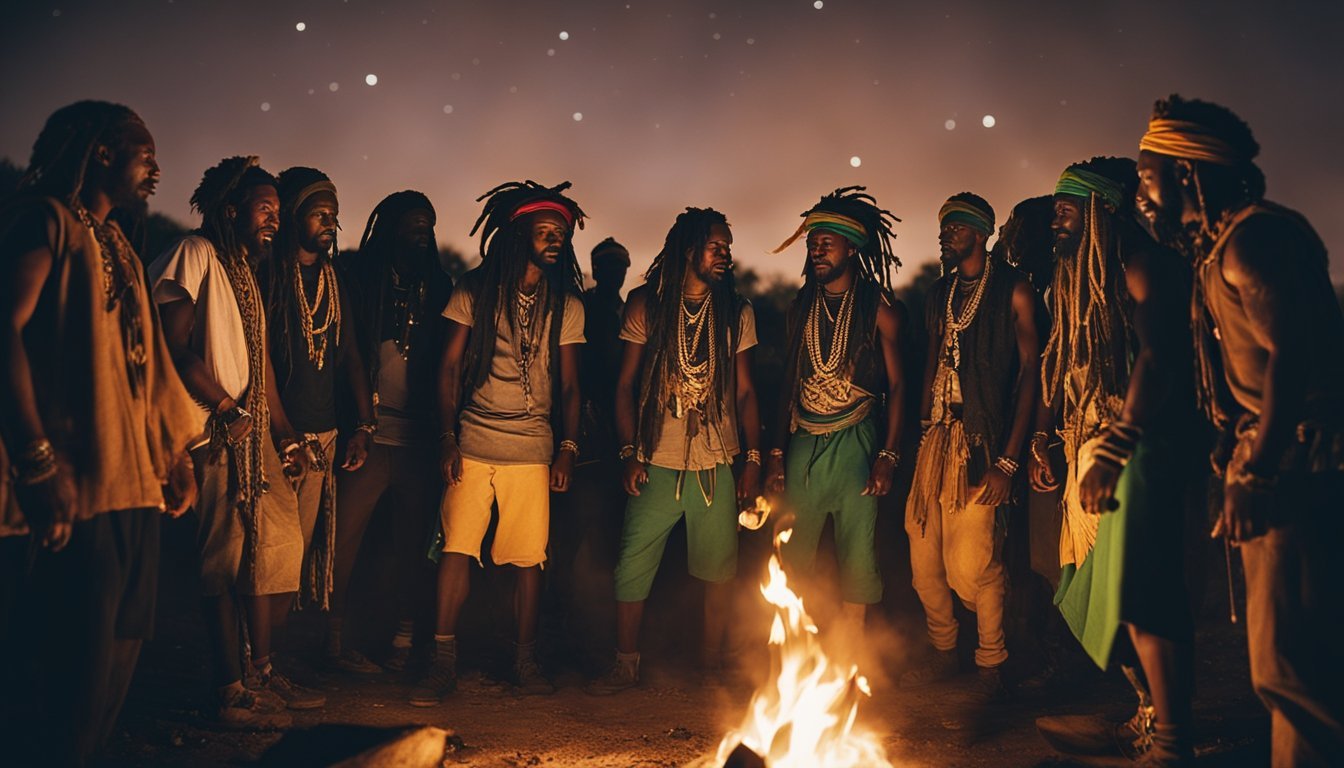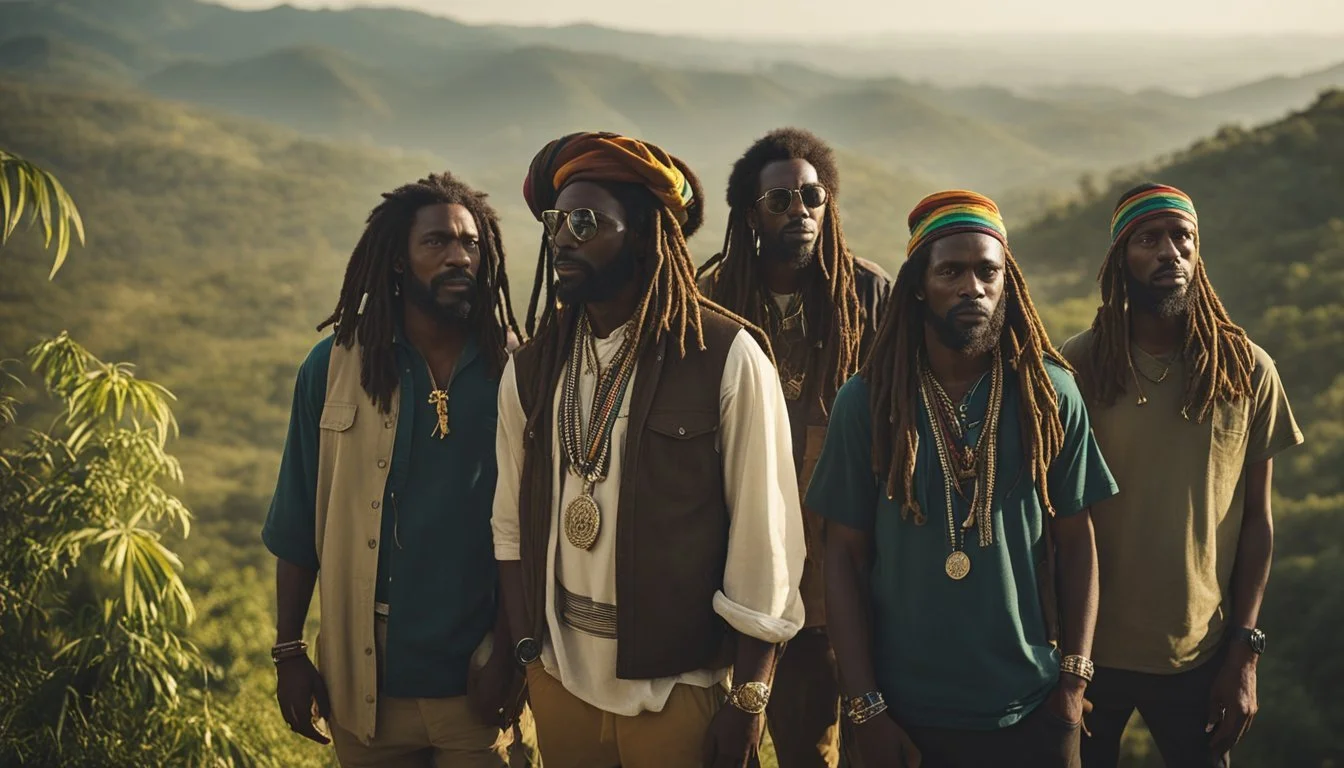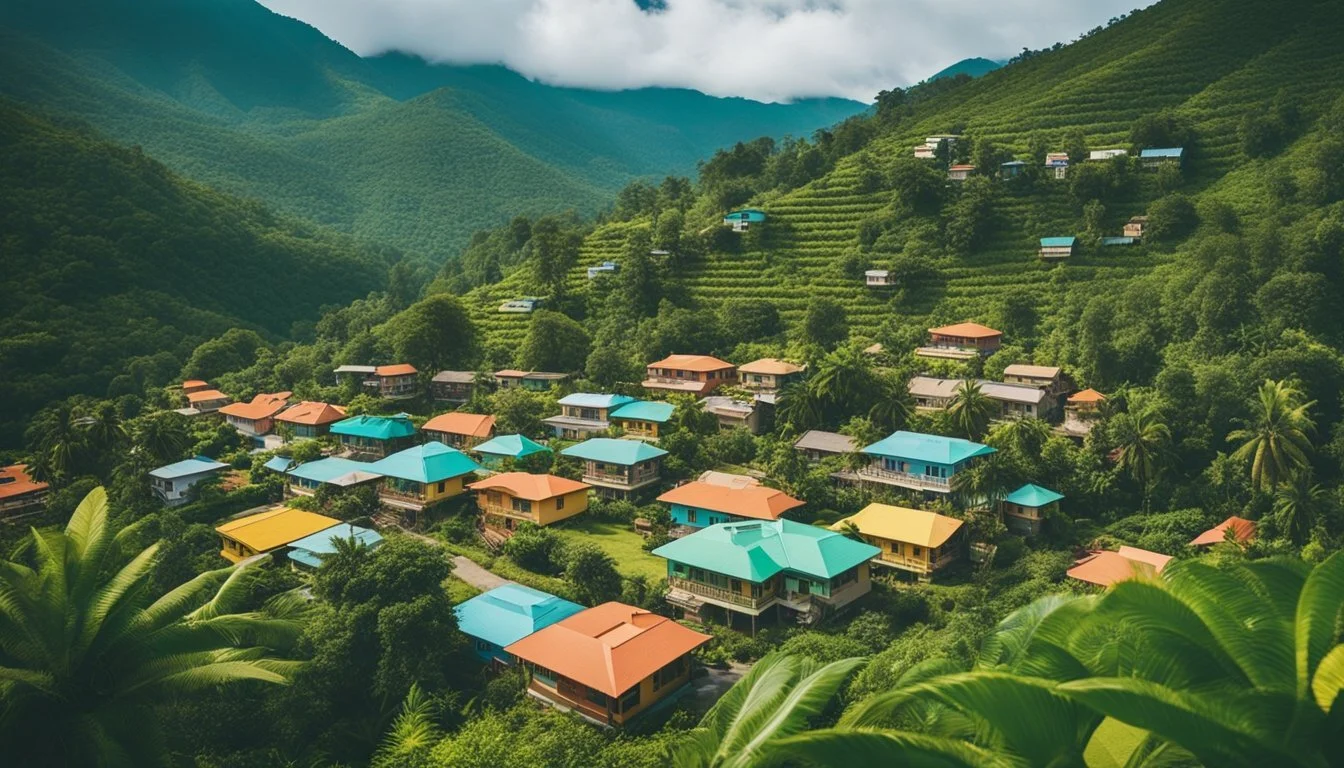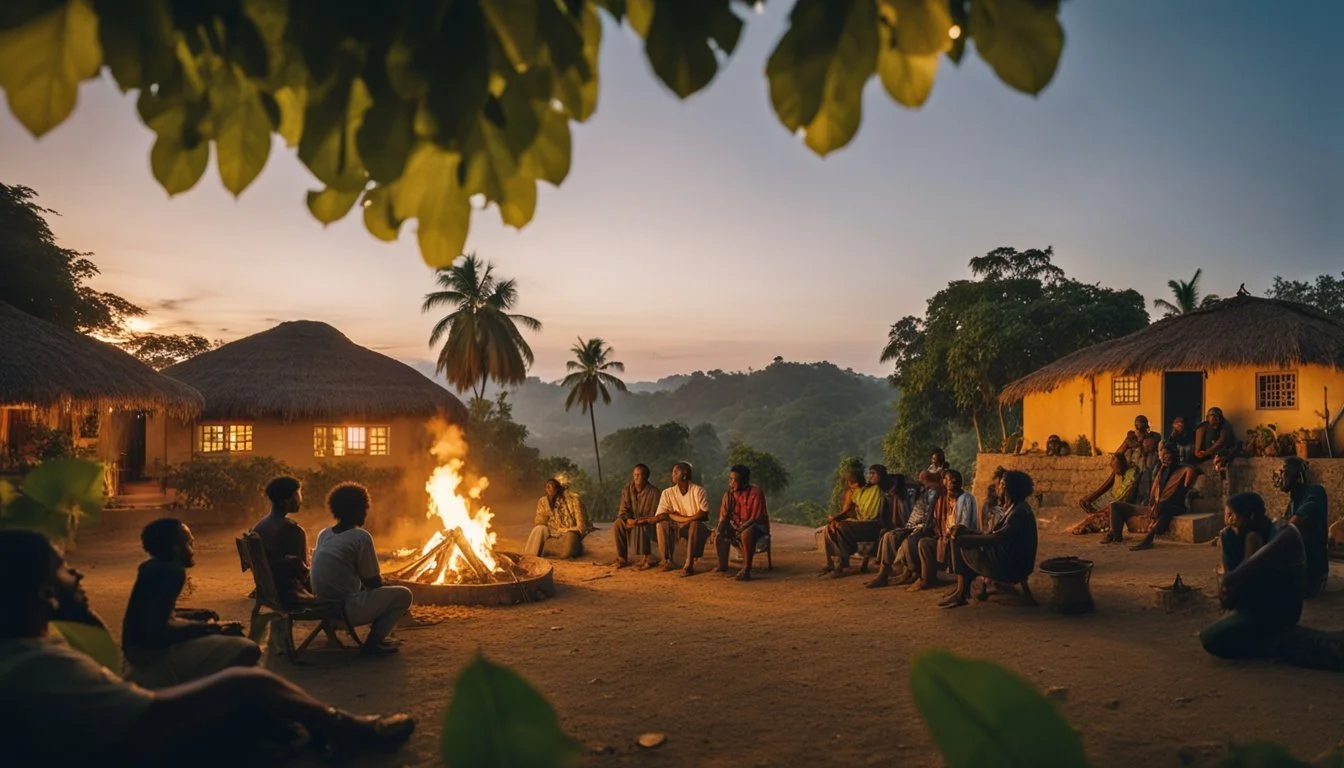7 True Crime Documentaries About Rastafarian Communities
Exploring Intriguing Cases
True crime documentaries have a unique ability to captivate audiences by shedding light on the darker aspects of human behavior. The Rastafarian community, with its rich cultural and religious heritage, presents an intriguing backdrop for these true crime stories.
Exploring these documentaries offers valuable insights into the complex interactions within Rastafarian communities, while also uncovering the challenges they face. Through the lens of true crime, viewers gain a deeper understanding of both the cultural significance and the societal pressures affecting these communities.
1) Mystic Warriors: Inside the Rastafarian Movement
"Mystic Warriors: Inside the Rastafarian Movement" (2013) provides a unique look into the lives of Rastafarian communities. This documentary explores the origins of Rastafarianism, a religion that emerged in Jamaica during the 1930s as a response to the racial and social injustices faced by the African diaspora.
The film focuses on the principles and beliefs that form the core of Rastafarianism. It covers the reverence for Emperor Haile Selassie I of Ethiopia, considered by adherents as the living God who will lead them to salvation.
Viewers are introduced to the vibrant culture of Rastafarians. The film delves into their spiritual practices, rituals, and the use of cannabis in religious ceremonies, which is believed to bring them closer to Jah, or God.
Scenes captured in the documentary highlight the everyday struggles and triumphs of Rastafarian individuals. It also showcases the Rastafarian commitment to peace, love, and unity, as well as their efforts to promote social justice and equality.
The documentary offers a glimpse into the rich history, traditions, and social impact of the Rastafarian movement, making it an enlightening watch for those interested in the intersection of religion and cultural identity.
Watch more about "Mystic Warriors: Inside the Rastafarian Movement" here.
2) Haile Selassie: The Untold Story
Haile Selassie, born Ras Teferri Mekonen, ruled Ethiopia from 1930 to 1974. His name, Ras Teferri, translates to "Chief Teferri" in Amharic. He became a symbol of divine leadership for the Rastafarian movement, which originated in Jamaica in the 1930s.
Many Rastafarians believe Selassie was a living God. His 1966 visit to Jamaica reinforced this belief, celebrated annually as Grounation Day. Despite his death in 1975, some Rastafarians still hold him as a divine figure, while others have adapted their beliefs around his legacy.
During his reign, Selassie navigated global politics skillfully. He formed alliances with Western powers, receiving military support from the US against the USSR. His leadership extended beyond Ethiopia, impacting global Rastafarian theology and Ethiopian symbolism.
Selassie's divinity is controversial in Ethiopia. Some regard him as a national hero, while others view him critically. Recent destruction of his monuments reflects ongoing debates about his legacy. His influence on Rastafarianism, however, remains significant and enduring.
For more information, refer to the documentary Rastamentary (2011).
3) Rastas and Rebels: A True Crime Insight
The documentary "Rastamentary" (2012) sheds light on the unique intersection of Rastafarian beliefs and societal bias. This film highlights the tension between the peaceful tenets of the religion and the criminalization of practices like marijuana use. The narrative explores the experiences of individuals facing prejudice due to their religious practices. More about Rastamentary
"Prejudice against Rastas" (Year not specified) delves into the hardships faced by Rastafarians in South Africa. Personal stories reveal instances of discrimination and prejudice fueled by misconceptions about Rastafarian rituals. These testimonies illustrate the community's resilience against societal judgment. Learn about Prejudice against Rastas
4) Green and Gold: Crimes in Rastafarian Culture
Documentaries focusing on crimes within Rastafarian communities often explore the complex interplay between cultural identity, socio-economic struggles, and criminal behavior.
These films delve into situations where the vibrant symbols of Rasta culture, such as the iconic green and gold colors, intersect with crime.
Green and Gold: A Glimpse Into Rastafarian Troubles (2021)
This documentary investigates crimes in Jamaican Rastafarian communities, outlining how economic hardships lead to involvement in illicit activities. The film provides insightful interviews with community members and experts. More Information
Rasta Crime Wave: Inside the Shadows (2018)
Exploring a series of high-profile crimes linked to Rastafarian figures, this documentary examines the root causes and societal impacts of these criminal activities. More Information
Colors of Conflict: Crime and Rastafari (2014)
This film focuses on the internal and external conflicts within Rastafarian communities, presenting both historical and contemporary instances of crime. More Information
Beyond the Colors: Criminal Elements in Rastafari (2019)
Investigating how Rastafarian symbols can sometimes be exploited in criminal endeavors, this documentary sheds light on sensational cases that taint the image of the community. More Information
5) Sacred Smoke: The Mysteries Unveiled
Released in 2019, "Sacred Smoke: The Mysteries Unveiled" explores the deeply spiritual and cultural significance of cannabis within Rastafarian communities. It delves into the rituals and daily practices that affirm the herb's role in their faith.
This documentary features interviews with Rastafarian elders and community members, providing insight into their perspectives. The filmmakers visit various communities across Jamaica to capture the essence of their spirituality.
"Sacred Smoke" also examines the historical and legal challenges Rastafarians face concerning the use of cannabis. The film provides a balanced view of the ongoing struggle for religious freedom and cultural preservation within the framework of modern legislation.
The visual storytelling in the film is notable for its authentic portrayal of the Rastafarian way of life. It succeeds in capturing the serene and meditative atmosphere that surrounds their rituals, presenting a true reflection of their beliefs.
For further details on "Sacred Smoke: The Mysteries Unveiled," see the movie's IMDb page.
6) Rasta Vigilantes: Justice in the Hills
"Rasta Vigilantes: Justice in the Hills" (2015) examines how certain Rastafarian communities in Jamaica take justice into their own hands. It provides a rare glimpse into the secluded hill communities, often isolated from mainstream society, where traditional law enforcement is absent.
The film follows a group of vigilante Rastafarians who patrol their region. They aim to protect their community from external threats and internal disputes. This form of community justice highlights the Rastafarians' desire to maintain peace and order based on their principles.
Interviews with community members reveal their perspectives on justice and self-governance. They emphasize the importance of maintaining harmony and protecting their way of life from those who might exploit or harm them.
Viewers are also shown the complex relationship between these communities and the official legal system. While some see the vigilantes as protectors, others view them as a troubling sign of lawlessness in isolated areas.
For more information on "Rasta Vigilantes: Justice in the Hills," visit the film's Wikipedia page.
7) Kingston Shadows: Rastafari and the Underworld
"Kingston Shadows: Rastafari and the Underworld" (2024) is a gripping documentary that explores the intersection of Rastafarian culture and criminal elements in Kingston, Jamaica. The film provides a balanced view, avoiding sensationalism, and focusing on real-life stories and historical facts.
The documentary examines how some individuals associated with Rastafarianism have been linked to criminal activities. It delves into the socio-economic challenges faced by these communities, offering context for the choices made by some members.
Viewers are taken through in-depth interviews with former gang members, law enforcement, and scholars. These perspectives provide a comprehensive understanding of the complex relationship between Rastafarianism and the underworld in Kingston.
The film also sheds light on efforts within the Rastafarian community to combat crime and promote peace. Community leaders and activists share their initiatives aimed at reducing violence and fostering positive social change.
"Kingston Shadows: Rastafari and the Underworld" serves as an educational tool, challenging stereotypes and offering nuanced insights into a rarely discussed aspect of Rastafarianism. The documentary is a must-watch for those interested in understanding the multifaceted nature of this cultural and religious movement.
Historical Context of Rastafarian Communities
The development of Rastafarian communities is steeped in rich cultural, religious, and historical traditions. Key points include the origins of Rastafarian beliefs and the influence of significant figures and events on the movement.
Origins and Beliefs
Rastafarianism emerged in the 1930s in Jamaica, strongly influenced by Marcus Garvey's Back-to-Africa movement. The religion centers on the worship of Haile Selassie I, former Emperor of Ethiopia, who followers believe is the incarnation of God (Jah).
Key principles include Afrocentrism, resistance to oppression, and the spiritual use of cannabis. The term "Babylon" refers to the Western world's social and political systems, viewed as oppressive and corrupt. Rasta followers aim to live in harmony with nature and reject materialism.
Significant Figures and Events
Marcus Garvey is pivotal in creating the ideological groundwork for Rastafarianism through his advocacy for black empowerment. Haile Selassie's 1930 coronation was a defining event, reinforcing his divine status among followers.
Other notable figures include Leonard P. Howell, who established the first Rastafari community, Pinnacle, in the 1940s. Events such as the Coral Gardens incident in 1963, where Jamaican authorities clamped down on Rastas, highlight the community's struggles and resilience. Recognition and compensation for these injustices are recent developments that mark progress and acknowledgement of Rastafarian contributions.
Exploring True Crime in Rastafarian Communities
Examining true crime in Rastafarian communities involves addressing common misconceptions and analyzing specific crime patterns. This section offers a detailed insight into these critical aspects.
Common Misconceptions
Rastafarianism often faces misrepresentation. Many mistakenly believe that this spiritual movement is associated broadly with criminality or violence. Influenced by media portrayals and lack of understanding, these stereotypes are far from the truth.
Rastafarianism is primarily about spirituality, peace, and a return to African cultural roots, rather than crime. Fundamental principles like the reverence for Haile Selassie and the rejection of Western materialism are central.
Moreover, discussions around true crime should differentiate between individuals and the collective ideology. Focusing on isolated incidents without context can distort public perception, unfairly stigmatizing a diverse and rich cultural movement.
Analyzing Crime Patterns
Crime patterns within Rastafarian communities need careful examination. It’s crucial to identify whether specific crimes are linked directly to the movement or individual actions. In some instances, poverty and systemic discrimination play larger roles.
Comparative studies reveal that crime rates in Rastafarian communities do not significantly deviate from other marginalized groups. Social and economic factors often overshadow religious affiliation when interpreting criminal behavior.
Lastly, there's a need for more nuanced research. Policymakers and researchers should focus on contextual variables, offering a clearer picture of any correlation between crime and the sociocultural dynamics within Rastafarian communities.









